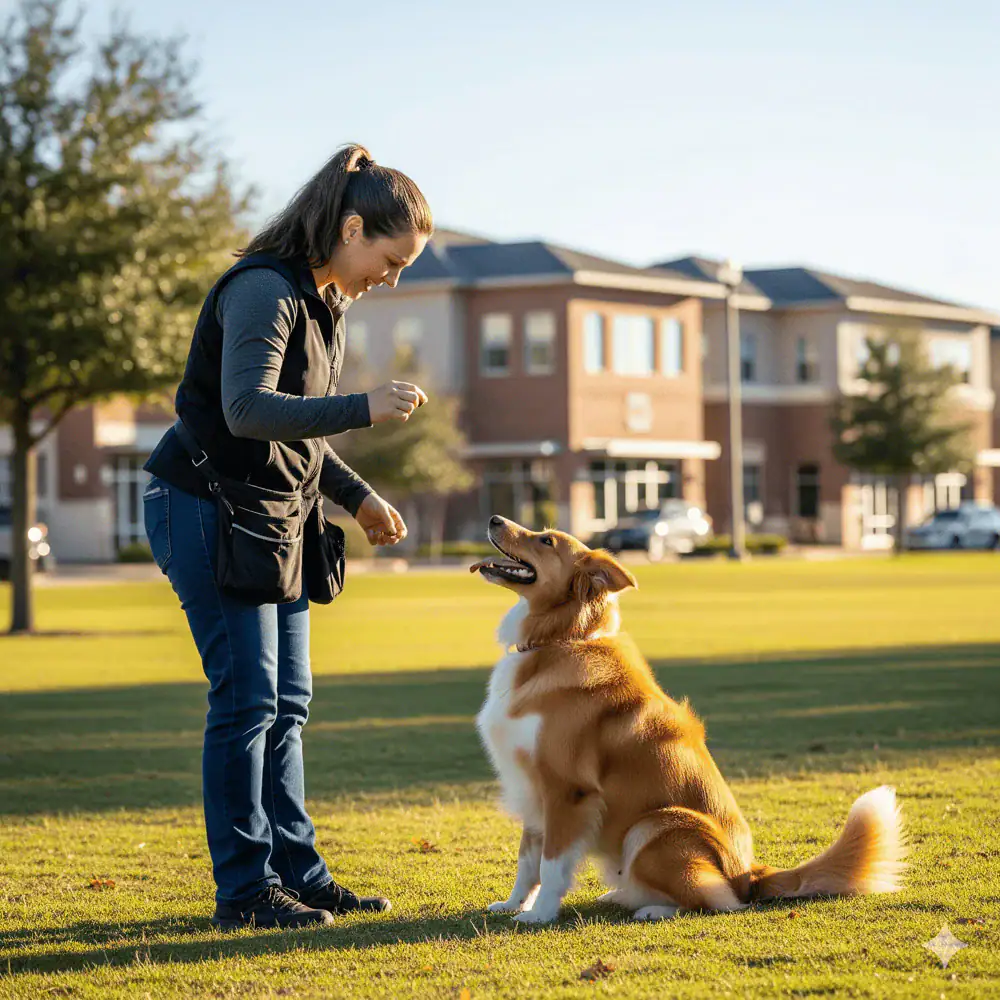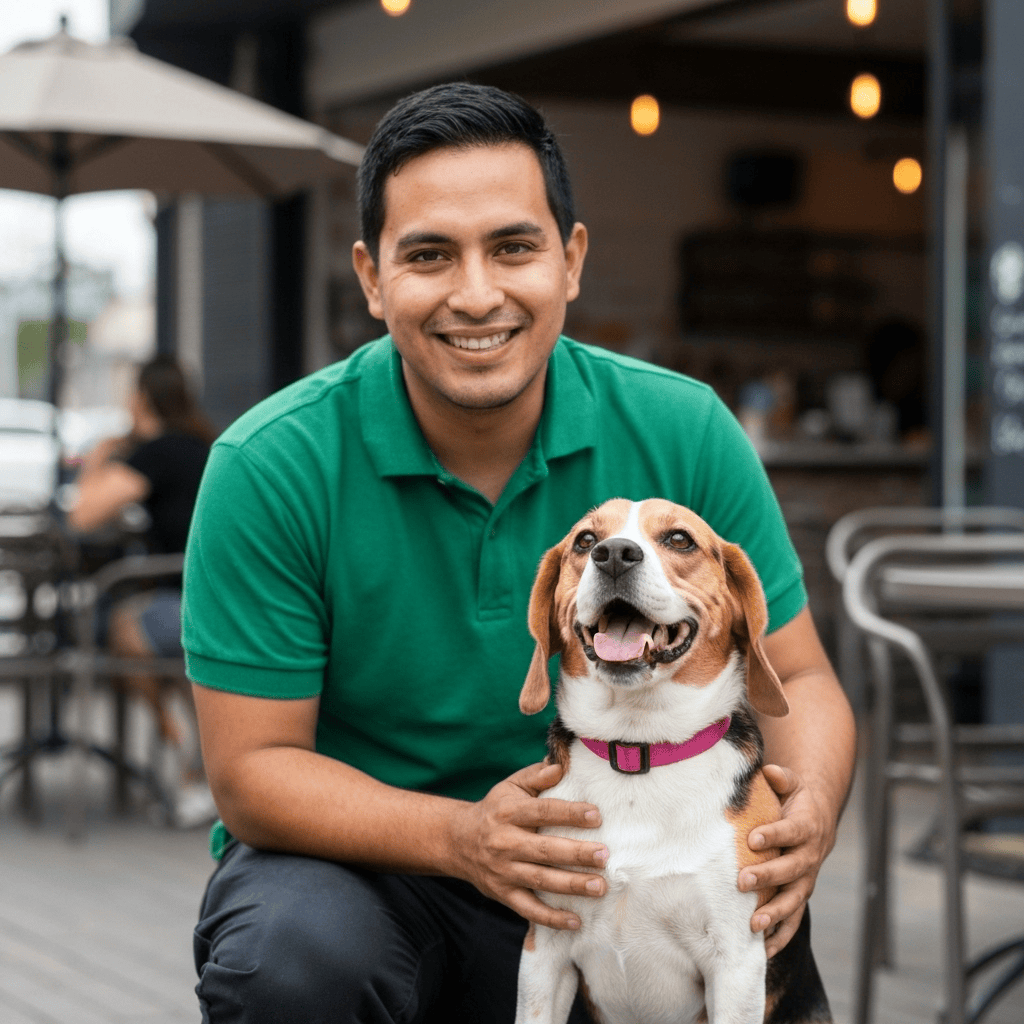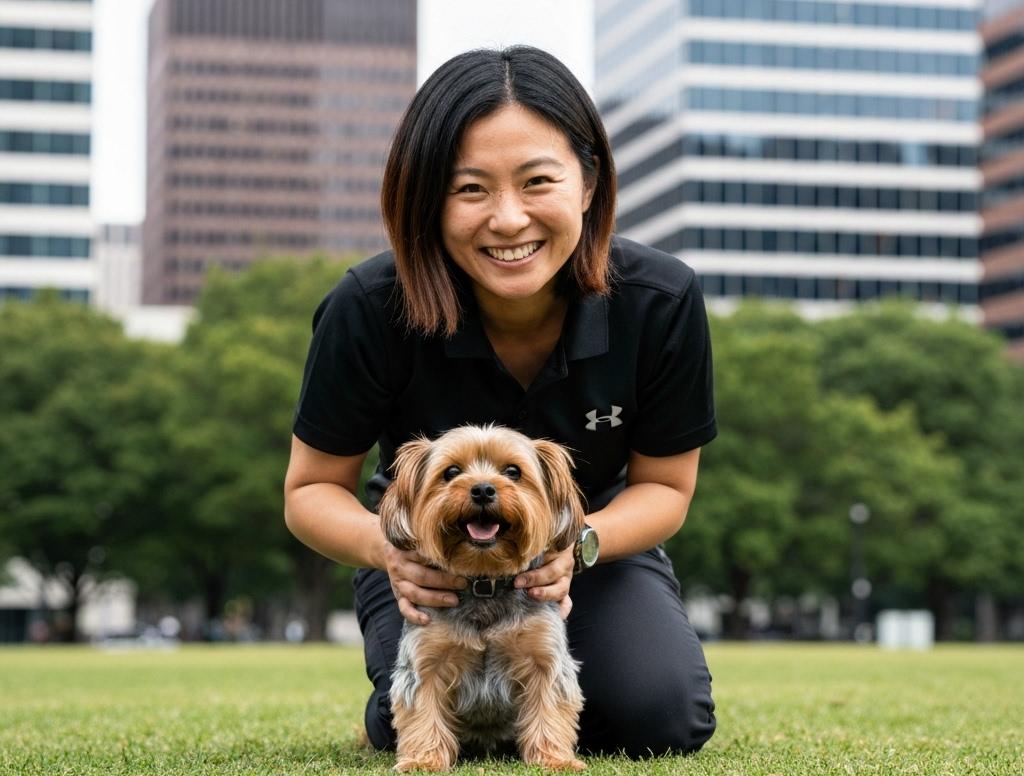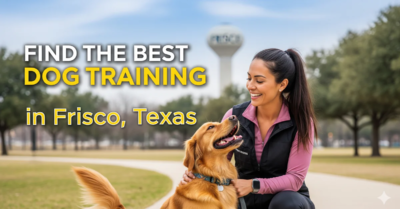Your Complete Guide to Choosing a Dog Trainer in Frisco
When you walk your dog around Frisco Square on a busy Saturday or navigate through crowds at The Star, you quickly realize that basic training isn’t enough. Your dog needs to handle real-world situations, not just sit quietly in your living room.
If you’re looking for dog training in Frisco, you’re probably wondering about costs, what methods actually work, and where to find someone who understands life in this bustling North Texas city. Since Frisco straddles both Collin and Denton counties, there are also some local rules worth knowing before you start your search.
Finding a Trainer Who Gets Frisco Life
The best trainers around here understand that your dog needs to walk calmly past kids on scooters, handle the weekend farmers market crowds, and stay focused when joggers pass by on the trails. This means looking for someone who uses positive reinforcement methods that build your dog’s confidence rather than shut them down.
When you’re interviewing trainers, ask about their education and certifications. Look for credentials like KPA-CTP, CPDT-KA, CBCC-KA, IAABC-CDBC, or CTC. These aren’t just fancy letters after someone’s name – they show the trainer keeps learning and follows ethical guidelines.
You’ll also need to decide between in-home training, group classes, or day training programs. In-home works great if you live in an apartment or have strict HOA rules about visitors. Group classes give your dog practice with distractions, which is huge for success in public spaces. Day training lets a pro work with your dog during the week while teaching you the techniques on weekends.
For serious behavioral issues like aggression or severe anxiety, look for trainers with advanced certifications such as CPDT-KSA or specialized behavior training. These problems need someone with deep experience, not just basic obedience knowledge.
Here’s something that surprises many people: Texas doesn’t actually license dog trainers. Neither Collin nor Denton County requires special permits for training dogs. This means anyone can call themselves a trainer, which is why those certifications matter so much. Good trainers carry liability insurance and will gladly share their policies with you.
Training Methods That Actually Work

Most successful trainers these days use positive reinforcement, which means rewarding the behaviors you want to see more of. Your dog sits politely when someone approaches? He gets a treat. She walks nicely on leash past the playground? Praise and maybe a quick game of tug.
This approach works especially well in Frisco because it builds confidence. A confident dog can handle the sensory overload of the Rail District or stay calm when kids run by at the community center. Fear-based training often creates dogs who shut down in new situations, which isn’t helpful when you’re trying to enjoy all the activities this city offers.
For dogs who already have issues with other dogs, strangers, or loud noises, trainers often use something called desensitization and counterconditioning. Basically, they start at a distance where your dog notices the trigger but stays relaxed, then pair it with something amazing (like high-value treats). Over time, they gradually decrease the distance as your dog learns that the scary thing predicts good stuff.
Management is another key piece that many people overlook. While your dog is learning new skills, you use tools like baby gates, no-pull harnesses, or smart scheduling to prevent rehearsal of problem behaviors. Think of it as setting your dog up for success while the training takes hold.
If you have a puppy, socialization becomes critical during their first few months. But this doesn’t mean throwing them into chaotic situations. Good socialization is controlled exposure to new sights, sounds, surfaces, and friendly people in a way that keeps your puppy feeling safe and confident.
Stay away from trainers who rely on intimidation, shock collars, or dominance-based methods. Besides being outdated, these approaches can create bigger problems down the road, especially in a busy public environment where you need your dog to think clearly and make good choices.
What You’ll Actually Pay for Training in Frisco
Training costs in Frisco run similar to the rest of North Dallas, with a small premium if you want in-home services in some of the higher-demand neighborhoods. Here’s what you can expect to pay in 2025:
| Service Type | Typical Price Range |
|---|---|
| Group class series (4 to 6 weeks) | $170 to $320 |
| Private in-home session (60 to 90 minutes) | $120 to $190 |
| Puppy training package (4 to 6 lessons) | $420 to $750 total |
| Day training per week | $550 to $950 |
| Board and train, 2 to 4 weeks | $2,200 to $4,800 total |
| Initial behavior consult | $150 to $260 |
Some trainers charge extra for travel if you live north of SH 121 or way out along the Dallas North Tollway. Make sure you understand what’s included in each package and how many follow-up sessions you’ll get. The cheapest option isn’t always the best value if you end up needing extra help later.
Questions That Help You Pick the Right Trainer
Before you commit to working with anyone, get clear answers to these questions:
- What specific training methods do you use, and how do you keep sessions positive for dogs who might be stressed or overwhelmed?
- What certifications do you hold, and how do they influence the way you work with dogs and owners?
- How will you customize a training plan for my specific goals, whether that’s better leash manners or helping my dog stay calm around crowds?
- Do you offer different training formats (in-home, group classes, day training), and which would work best for my schedule and budget?
- How do you measure progress, and when do you add more challenging distractions?
- What exactly is included in your training package, and what are the total costs including any additional fees?
- Do you carry liability insurance, and can you provide proof?
- If my dog has behavioral issues, do you work with veterinarians when needed?
Local Rules That Affect Your Training Plans

Frisco keeps pretty straightforward pet rules, but knowing them ahead of time helps you train without running into problems.
Dogs must be leashed in all public areas except inside the designated off-leash zones at the dog park. This means you’ll want to nail down reliable leash skills and recall before trying the off-leash areas. Always clean up after your dog – keep waste bags attached to your leash for walks around town.
Texas requires current rabies vaccination for all dogs, and you can find the most up-to-date information at the Texas DSHS website. If your trainer wants to run commercial group classes in public parks, they may need permits from the city. Most trainers handle this behind the scenes, but it’s worth asking.
For lost or found pets, start with the City of Frisco's Animal Services resources.
One thing that confuses some residents: Frisco sits in both Collin and Denton counties. If you’re not sure which county you’re in, check your property tax bill. Collin County Animal Services helps residents on the east side of town, while Denton County covers the west side.
Places to Practice Around Frisco
Once you start training, you’ll need spots to practice real-world skills. The Ruff Range Dog Park at B. F. Phillips Community Park offers separated areas for small and large dogs, with posted rules to help everyone have a good experience.
For general city information and updates about parks or Animal Services, check the City of Frisco website. If you live on the east side of town, Collin County Animal Services provides resources and shelter information. West side residents can find services through Denton County’s Animal Services section.
The Visit Frisco website has great information about walking routes and pet-friendly events around town. For practicing leash manners and public behavior, The Star in Frisco and Frisco Square offer real-world distractions during quieter times.
When you practice in these spaces, keep sessions short and positive. Bring really good treats and be ready to give your dog space if they need a break.

Common Questions About Dog Training in Frisco
Do I need a city pet license in Frisco?
Frisco focuses on rabies vaccination requirements and responsible ownership. Licensing rules can change, so check the current requirements through the city website. Your vet can help you stay current with vaccines and records.
Are dog trainers licensed in Texas?
No, Texas doesn’t issue dog trainer licenses. This makes it extra important to choose trainers with voluntary certifications and liability insurance.
Can trainers run group classes in Frisco parks?
Casual practice on leash is fine as long as you follow posted rules. Commercial training classes may require permits from the city, so ask your trainer how they handle this.
What vaccinations does my dog need?
Texas requires current rabies vaccination. Check the Texas DSHS rabies information for statewide requirements. Your vet may recommend additional vaccines based on your dog’s lifestyle.
Where can I let my dog run off leash?
Only in designated off-leash areas like Ruff Range Dog Park. Everywhere else requires a leash.
How long does training usually take?
Basic manners typically take 4 to 8 weeks with daily practice at home. Behavioral issues like fearfulness or reactivity often need longer, more gradual programs with ongoing professional support.
What should I bring to group classes?
A well-fitted collar or harness, a standard 6-foot leash, water for your dog, and lots of small, high-value treats. Bring vaccination records if your trainer requests them. Leave retractable leashes at home for safety reasons.
Can trainers help with service dog training or therapy dog preparation?
Ethical trainers can help with public access skills, task foundations, or preparation for therapy dog evaluations. Make sure they have experience in these areas and understand the specific requirements.
The right trainer will combine humane, science-based methods with practical experience in busy environments like ours. With consistent practice and professional guidance, your dog can learn to handle everything Frisco has to offer, from weekend festivals to daily neighborhood walks.
